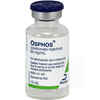Osphos


Prescription required.
Learn more
Don’t have a veterinarian? Book an appointment with Vetster
 Temporarily Out of Stock
Temporarily Out of Stock
 Thank you, we will notify you when this product is available.
Thank you, we will notify you when this product is available.
Prescription required.
Learn more
Don’t have a veterinarian? Book with Vetster


What is Osphos?
Osphos (clodronate injection) is used for the control of clinical signs associated with navicular syndrome in horses 4 years of age or older. Navicular syndrome is one of the most common lameness issues in adult horses in which the pain arises in the navicular bone, which sits deep within the hoof. Osphos is available as single-use vials and requires a prescription from your veterinarian.
For:
Horses (4 years or older)
Benefits:
- Controls symptoms of lamenesss (navicular syndrome)
- Helps limit the breakdown of bone
How does Osphos work?
Osphos contains clodronate disodium, a bisphosphonate, which are a class of drugs that are commonly prescribed to prevent bone loss. Clodronate specifically inhibits bone resorption by reducing the number of active osteoclasts. It also inhibits the formation and dissolution of calcium phosphate crystals in the bone matrix. These actions lead to a decrease in the breakdown of the bone.
Cautions:
The safe use of Osphos hasn't been evaluated in horses less than 4 years of age. The effect of bisphosphonates on the skeleton of growing horses hasn't been studied; however, bisphosphonates inhibit osteoclast activity which impacts bone turnover and may affect bone growth. Osphos shouldn't be used in pregnant or lactating mares, or mares intended for breeding. Use of bisphosphonates in horses with conditions or diseases affecting renal function isn't recommended. Administration of bisphosphonates has been associated with abdominal pain (colic), discomfort, and agitation in horses. Horses should be monitored for at least 2 hours following administration of Osphos.
Brand Name:
Osphos (Dechra)
Generic Name:
clodronate injection
What is the most important thing I should know about Osphos?
Osphos requires a prescription from your veterinarian. It is for intramuscular injection only and used for the control of symptoms associated with navicular syndrome in horses. Each 15 ml single-use vial contains 60 mg of clodronate. Osphos should only be used in horses 4 years of age or older. If there is no response to initial therapy, have your horse re-evaluated by your veterinarian. For horses that initially respond to Osphos but don't maintain clinical improvement for 6 months, Osphos may be re-administered at 3-6 month intervals based on recurrence of clinical signs. For horses that respond to Osphos and maintain clinical improvement for 6 months, Osphos should be re-administered after clinical signs recur. Clinical improvement is most evident at 2 months post-treatment. Administration of bisphosphonates has been associated with abdominal pain (colic), discomfort, and agitation in horses. Horses should be monitored for at least 2 hours following administration of Osphos.
What should I discuss with my veterinarian before giving Osphos to my pet?
Tell your veterinarian if your horse has a history of any conditions or diseases affecting renal function. Let your veterinarian know if your horse is pregnant, lactating or intended to be bred. Tell your veterinarian if your pet has a hypersensitivity to clodronate or other bisphosphonates.
How should Osphos be administered to my pet?
Osphos is for intramuscular injection only. Follow your veterinarian's instructions exactly as directed. Administer 0.81 mg/lb (1.8 mg/kg) by intramuscular injection up to a maximum dose of 900 mg per horse. Divide the total volume evenly into three separate injection sites. Discard unused vial contents. If there is no response to initial therapy, have your horse re-evaluated by your veterinarian. For horses that initially respond to Osphos but don't maintain clinical improvement for 6 months, Osphos may be re-administered at 3-6 month intervals based on recurrence of clinical signs. For horses that respond to Osphos and maintain clinical improvement for 6 months, Osphos should be re-administered after clinical signs recur.
What are the potential side effects of Osphos?
The most common side effects of Osphos are signs of discomfort, nervousness, cramping, pawing, and/or colic within 2 hours post-treatment. Horses should be monitored for at least 2 hours following administration of Osphos.
What happens if I overdose my pet on Osphos?
If an overdose is suspected, contact your veterinarian immediately.
What other drugs will affect Osphos?
Concurrent administration of other potentially nephrotoxic drugs should be approached with caution and renal function should be monitored.


Osphos Directions:
- Follow your veterinarian's instructions exactly as directed.
- Administer 0.81 mg/lb (1.8 mg/kg) by intramuscular injection up to a maximum dose of 900 mg per horse
- Osphos is provided in a single-use vial and does not contain a preservative. Discard unused vial contents.
Make sure to monitor your horse for at least 2 hours after administration of Osphos.
Osphos Dosage:
| Weight | Dosage |
|---|---|
| All weights | Administer 0.81 mg/lb (1.8 mg/kg) by intramuscular injection up to a maximum dose of 900 mg per horse or as directed by your veterinarian. |
| Cats |
|---|
| Do not use! |
| Dogs |
|---|
| Do not use! |
Storage:
Store at a controlled room temperature. Keep out of the reach of children and pets.


Osphos Ingredients:
| Active Ingredient (per ml) | Amount |
|---|---|
| Clodronate disodium | 60 mg |


 Swipe
Swipe
Customers also boughtView All
 Swipe
Swipe





















































